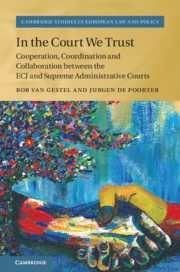 In the Court We Trust
In the Court We Trust Book contents
- In the Court We Trust
- Cambridge Studies in European Law and Policy
- In the Court We Trust
- Copyright page
- Dedication
- Contents
- Figures
- Series Editors’ Preface
- Preface
- 1 Why Don’t We Talk?
- 2 Dialogue as a Concept
- 3 Case Law Analysis
- 4 Results from the Interviews
- 5 Trust and Dialogue
- 6 Conclusion and Future Scenarios
- Index
4 - Results from the Interviews
Published online by Cambridge University Press: 28 November 2019
- In the Court We Trust
- Cambridge Studies in European Law and Policy
- In the Court We Trust
- Copyright page
- Dedication
- Contents
- Figures
- Series Editors’ Preface
- Preface
- 1 Why Don’t We Talk?
- 2 Dialogue as a Concept
- 3 Case Law Analysis
- 4 Results from the Interviews
- 5 Trust and Dialogue
- 6 Conclusion and Future Scenarios
- Index
Summary
Our interviews reveal that most judges from the CJEU and Supreme Administrative Courts realize there is at the moment little room for a dialogue that goes beyond one party asking questions and the other party answering them. Procedural mechanisms that could be used to facilitate a dialogue between both courts, such as: requests for clarification, provisional answers and leaving more leeway for highest courts to scrutinize potential preliminary questions before they are send to the CJEU, are relatively unpopular. A better “horizontal dialogue” between national courts before referring questions to the CJEU is considered useful by all parties but is troubled by language barriers, time constraints, and a failing communication infrastructure. Although better informed questions in combination with provisional answers could enhance the “vertical dialogue” with the CJEU, certainly not every judge is looking for this. We discovered major differences between on the one hand the judge-lawmaker, who wants to influence the way EU law is interpreted and the judge-arbiter, who is primarily focused on settling disputes. The latter judges feel the CJEU is better equipped to develop the course of EU law, while the former judges believe that in a multilevel legal order, this should be a mutual responsibility.
Keywords
- Type
- Chapter
- Information
- In the Court We TrustCooperation, Coordination and Collaboration between the ECJ and Supreme Administrative Courts, pp. 104 - 144Publisher: Cambridge University PressPrint publication year: 2019
